In the U.S., collegiate artistic swimming offers athletes the chance to pursue a university degree while continuing to compete at a high level. At the 2025 Collegiate National Championship, 13 teams—five varsity and eight club—brought together more than 100 swimmers, including many with elite experience.
Top varsity programs like Stanford, the Ohio State, and the University of the Incarnate Word (UIW) have become homes for many former national team athletes, while for others, college is just one step in a longer competitive journey.
In this four-part series, hear from Marloes Steenbeek (NED), Jacklyn Luu (USA), Nour Shamala (EGY), and Nikki Dzurko (USA) about their experiences following the collegiate artistic swimming path before coming back to swimming on the international stage.
Nour Shamala has been a member of the Egyptian national team through the various age groups, notably competing at the 2016 World Junior Championships, and 2017 World Championships at only 15.
In the lead-up to the Tokyo Olympic cycle, she reached a crossroads in her career and decided to explore new opportunities abroad. She moved to the United States for her final semester of high school, while training and competing with the club of ANA Synchro in Massachusetts.
Shamala was originally recruited to Lindenwood University, but after the artistic swimming program was cut in 2019, she signed with the University of the Incarnate Word (UIW) in San Antonio, Texas, where she swam from 2019 to 2023.
After finishing college, she returned to Egypt and eventually rejoined the senior national team, where at age 23, she is the oldest current member. Eight years after her last international assignment, Shamala was back at the 2025 World Championships, where she and her teammates finished 13th in technical team and 15th in acrobatic team.
Inside Synchro: Tell us more about how the opportunity to swim in the U.S. first come about.
Nour Shamala: I was on the Egyptian national team for many years before leaving to go to the U.S. I had already reached a very high level, but I felt like I was at a point of change, so I was like, “Okay, what’s next?”
Reem [Abdalazem, two-time Olympian, former collegiate artistic swimmer, and former U.S. national team assistant coach] has been my mentor for so many years. Nobody who’s Egyptian had ever gone to the U.S. except for her. When she knew everything that was going on with me, she was like, “You’re coming to the U.S.!”
It was really a leap of faith, honestly. At the time, I was only 16 and I had no clue what was waiting for me there. I went to ANA Synchro, and one of the girls on the team hosted me for my last semester of high school. I swam for the club for the season, which was great, and I got recruited to university from there.
IS: Did you always have your sights on UIW?
NS: No. I was originally going to Lindenwood, which is where Reem went, and I was about to sign with them when the coach told me the school was cutting the program. At the same time, a teammate of mine at ANA had mentioned she was planning on going to UIW. In terms of other schools back then, I only really knew of the Ohio State. A few of my teammates were going there too, but something felt like Ohio wasn’t for me.
So when this teammate told me about UIW, that she had already planned that out with the coach and everything, I was curious. I didn’t know the school at all; I remember going on Instagram and trying to look at them. Then she talked to the coach about me, and we got connected in that way.
It all just kind of happened from there. I think I had the last spot on the team at UIW. It’s crazy because I had actually decided on taking a gap year and my only plan was to go to London at that point, but it all worked out.
IS: How did UIW make you change your mind about your gap year then?
NS: What was really great about UIW is that it really took on the culture of recruiting people from all around the world. This diversity within the team definitely sold me. And I always say that with big things in my life that happen, I feel like they choose me. I don’t really choose them. I never really chose UIW— it kind of just fell on my lap.
What was so great about being with a lot of different girls from around the world is that you never really feel alone. Everyone is far away and missing home. Everyone took the same leap of faith to be there, and we were all there for the same reason. Even if we didn’t speak the same language, because a lot of international girls arrive without strong English, we still understood each other. We were speaking the same “swimming” language, and that was enough. We could figure things out because we all shared the same goal.
The beauty of that is, we each brought our own strengths, and together we created something meaningful. By the time you’re in college, you’ve been in synchro long enough to really understand it. You’re not just swimming for the sake of swimming anymore. You want to swim for something more, something bigger than yourself. That’s the culture we built at UIW: to do something not just for you, but for a bigger purpose.
IS: Overall, how was your time at UIW and on the team?
NS: My first year was crazy with everything: the language, the training, living somewhere completely different… It was definitely a massive adjustment, but that was also the start of becoming an adaptable athlete. You have to be a very certain type of personality to be able to learn a new culture, to learn tiny things that you have to do every single day that you were just not used to.
College was such a big part of my life, and I grew so much as a person. I started pretty young, at only 17 and I had left home only the year before. I was literally halfway across the world; it was a massive step to take at that age. It was hard, though. I’d wake up at 4:30 a.m. every single day, train from 5:00 to 10:00 am, run to classes, work, and then go to night classes my last two years from 6:00 to 9:00 pm. It was a very rigorous schedule. But like I said, knowing I wasn’t doing it alone, that everyone else was pushing for the same thing, meant a lot. I would do it all over again, 100%.
IS: Did you always plan to come back to elite afterwards?
NS: No, not at all. I went into depression after leaving the national team. The 2020 Olympic Games were my year, so when it didn’t happen, my heart was broken. When you’re at such a high level from a really young age and what you work towards for such a long time does not happen, you get really lost.
I was so broken that I didn’t even know I was going to do college synchro. At ANA, we had no plans for me to swim a solo or a duet at first. I just wanted to swim laps on the side, just to be at the pool. But later on, I ended up swimming pretty much everything because they really needed me. But no, I did not have any plans, I never knew if I was ever going to come back to elite synchro after UIW.
IS: And now, here you are! How has the transition been?
NS: Crazy tough. Being here in Egypt again, it’s not training eight hours a day, and only doing that. It’s training five hours a day, maybe five and a half, but also working. For me, it’s also the transition of figuring out my career at 23. I’m not a kid anymore, so I need to be working alongside training. So this transition of figuring out the life, work, training balance is very difficult.
Most people stop synchro, at least in Egypt, at 19 or 20. I’ve now been doing synchro for 19 years, and I keep learning things. It’s crazy. I’m learning from 15, 16, 17 year-olds, which is wild, and beautiful, because you’d think I’d be teaching them!
IS: Would you say collegiate synchro has helped you find your passion again, enough to return to elite then?
NS: 100 percent. The U.S. is a great place for athletes to go to, because you have that sense of life outside of the pool, and of university. It’s not like you’re giving everything to synchro and synchro only. You get to really have that college lifestyle, and to also learn and get your education, so it’s not as crazy as it would be if you’re training full-time on the national team.
A lot of people really, really get their passion back. They find a sense of love for the sport again after they lose it. It’s pretty much what happened to me. I needed to learn to swim not just for me, but for a bigger purpose. And that’s what the U.S. does, it teaches you that.
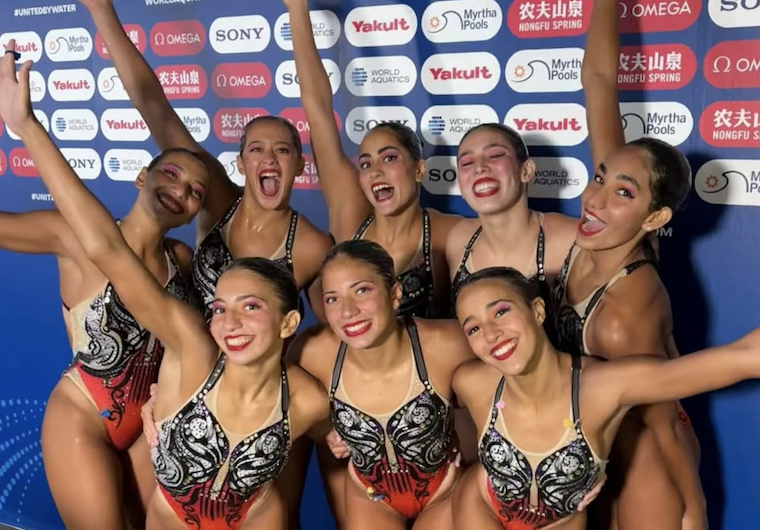
IS: Is that your most important takeaway from your collegiate experience?
NS: I’m still reflecting a lot on all of this, but yes, the biggest thing is swimming for something else— having purpose. And honestly, right now in Egypt, my whole point is to say that I just didn’t give up. We’ll see if I’m going to be able to make it to LA 2028. Maybe I will, maybe I won’t. The point is that you gotta just keep going. If this is something that you want, you will always find a way. It’s kind of the holistic feeling of having purpose, always finding purpose in whatever it is that you’re doing. That’s something that UIW really taught me and I definitely carry it with me.
IS: You mention LA 2028, is that a main goal of yours?
NS: The dream of going to the Olympic Games is still there, very much alive. I do want to become an Olympian, that’s probably the first time I’ve ever said that out loud, which is wild. I’ve been so used to being disappointed by that, but it has also fueled me so much.
My goal is to just try to swim, be my best self, and not force it. Not keep swimming just because I want to go to the Olympic Games and be miserable because this is the only thing I want. I always say if the Olympics was my only goal, I would have stopped a long time ago because three Olympic Games have passed by me as a fully capable athlete.
So my main goal is to continue swimming with this mindset, to enjoy it all, and build the sport in Egypt as much as I can. But at the same time, it’s definitely somewhere in there where I would love to make it for LA 2028.
Responses have been edited for length and clarity.
ARTICLE BY MARI FLORES
Cover photo courtesy of Nour Shamala.
If you’ve enjoyed our coverage, please consider donating to Inside Synchro! Any amount helps us run the site and travel costs to cover meets during the season.

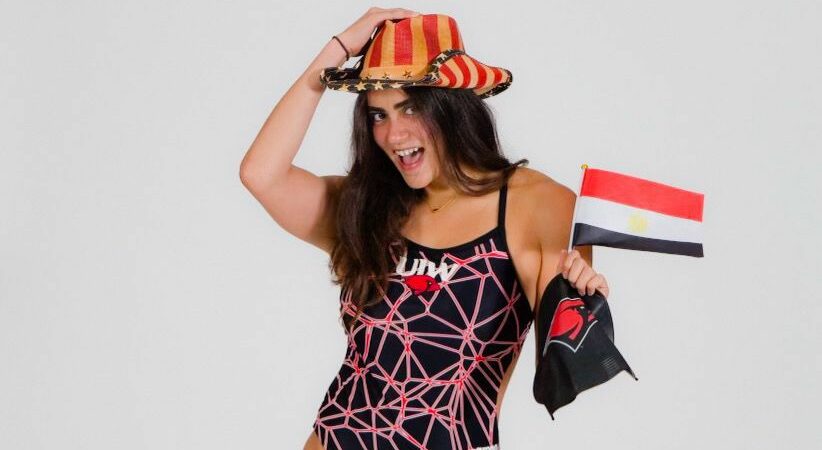
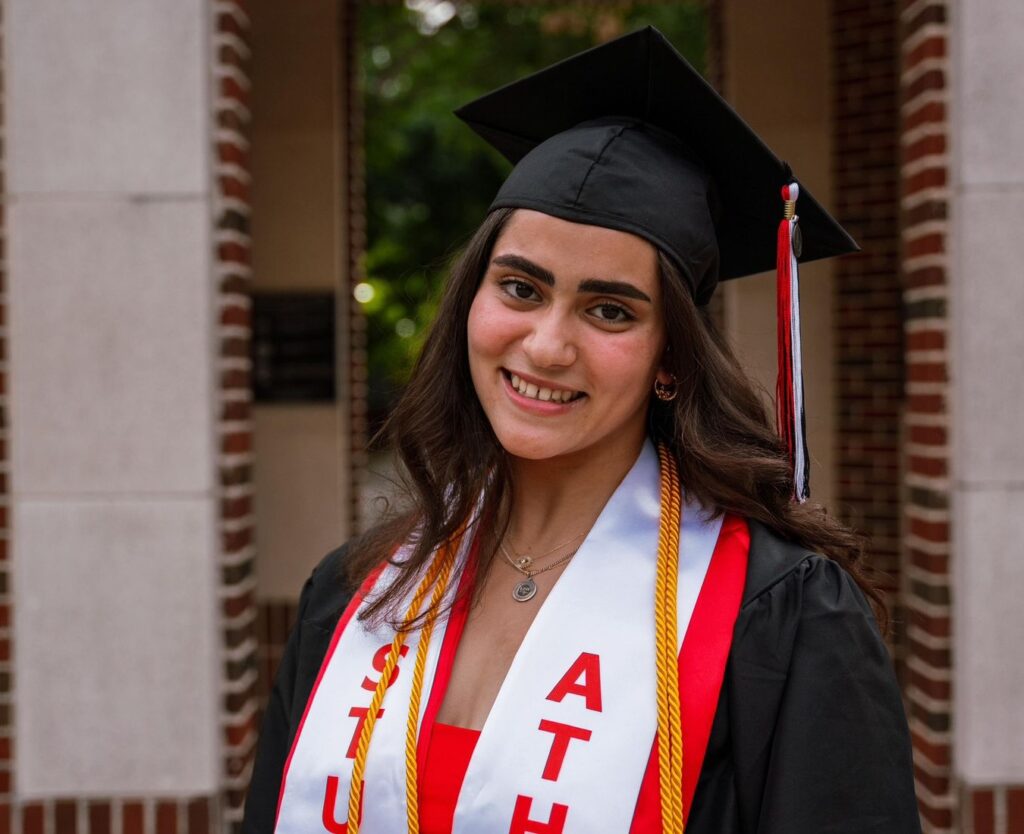
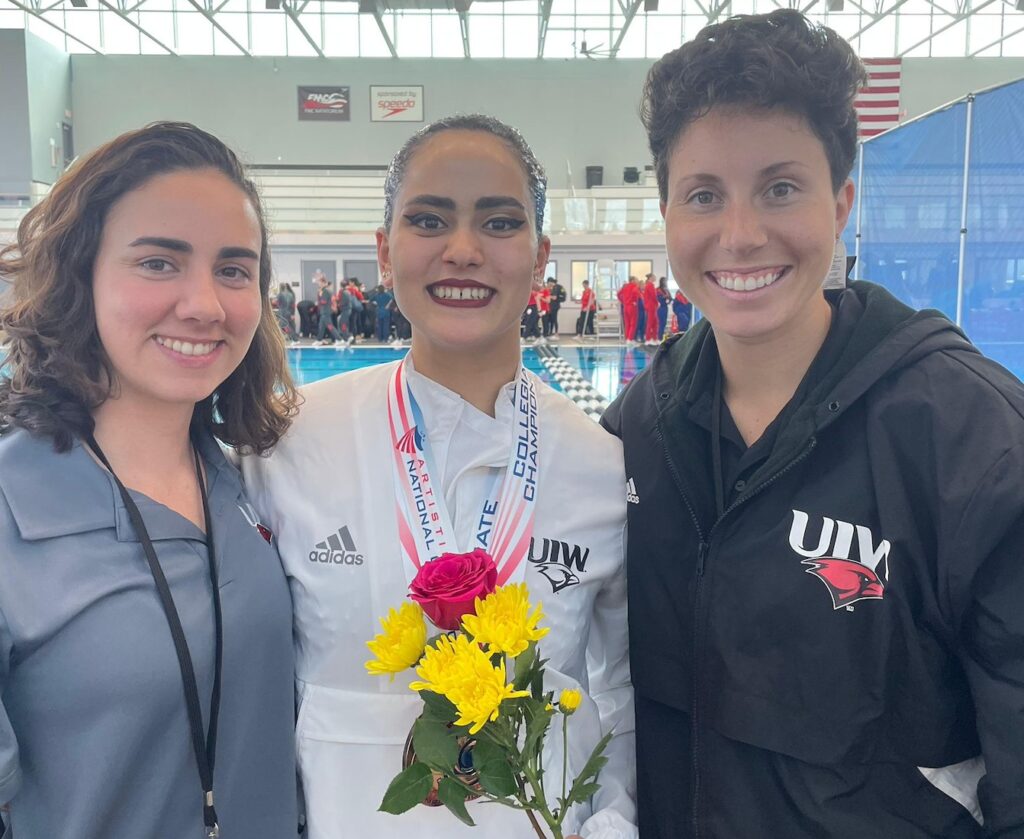
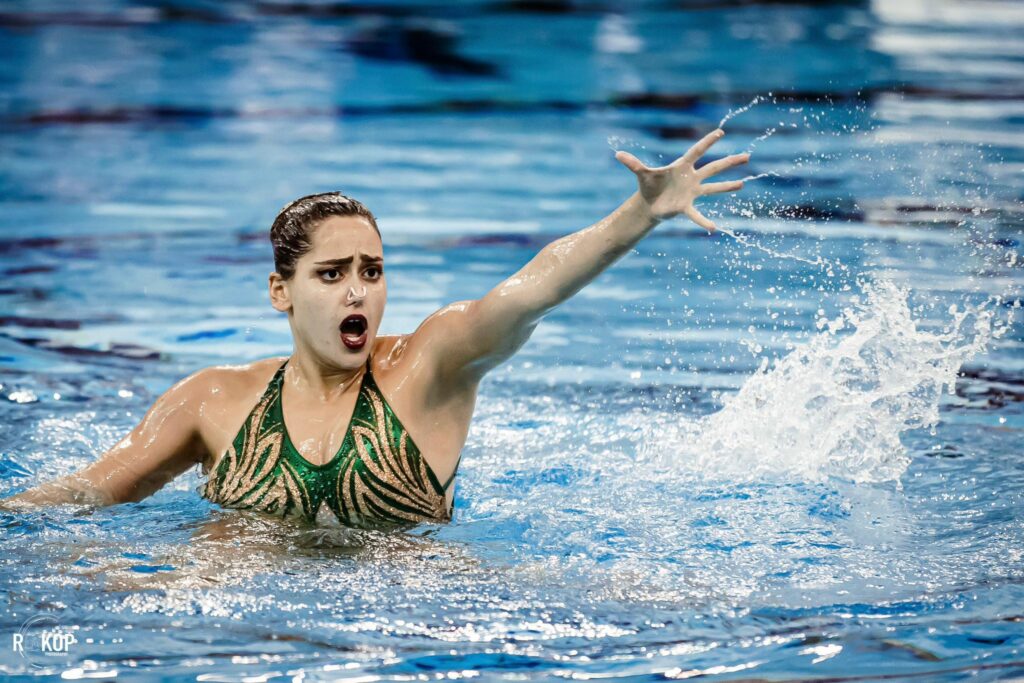
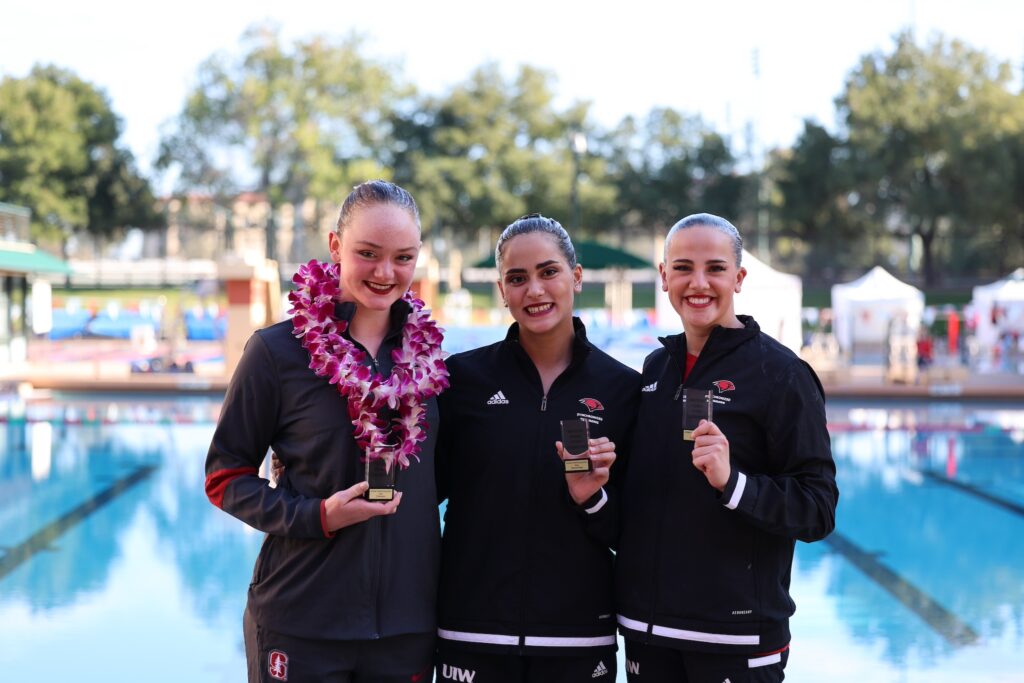
This might sound a little bit odd but I wanna tell you that I’m a very proud dad proud of your achievements proud of your persistence proud of your perseverance. You always make me happy, I look at you when you swim, and I feel very privileged to have a daughter in your capacity you always make us anxious about your next step from one success to the other from one stage to a higher, I love you to the moon and way beyond and I know you will get there to whatever you want. keep pushing, but don’t forget to enjoy the journey. You’re proud dad.